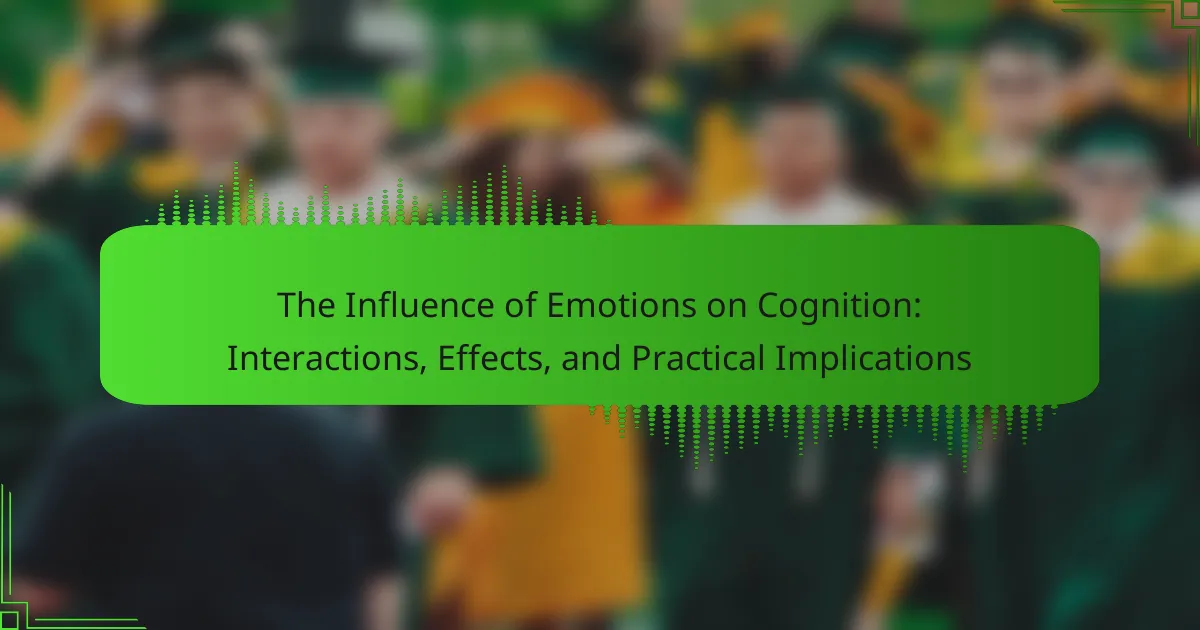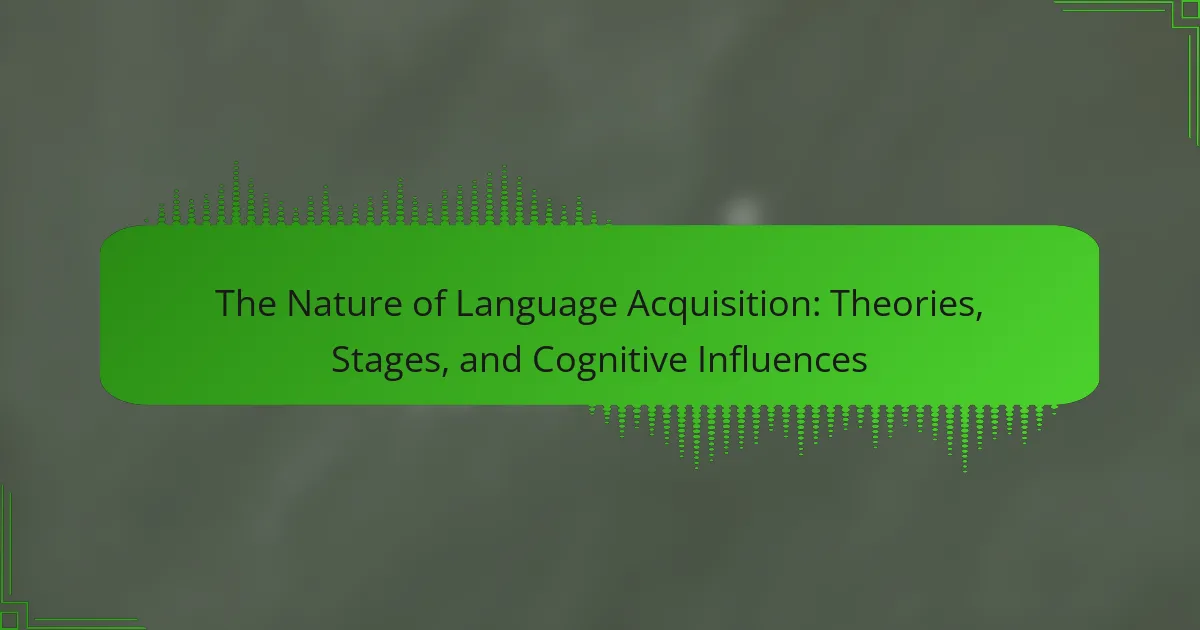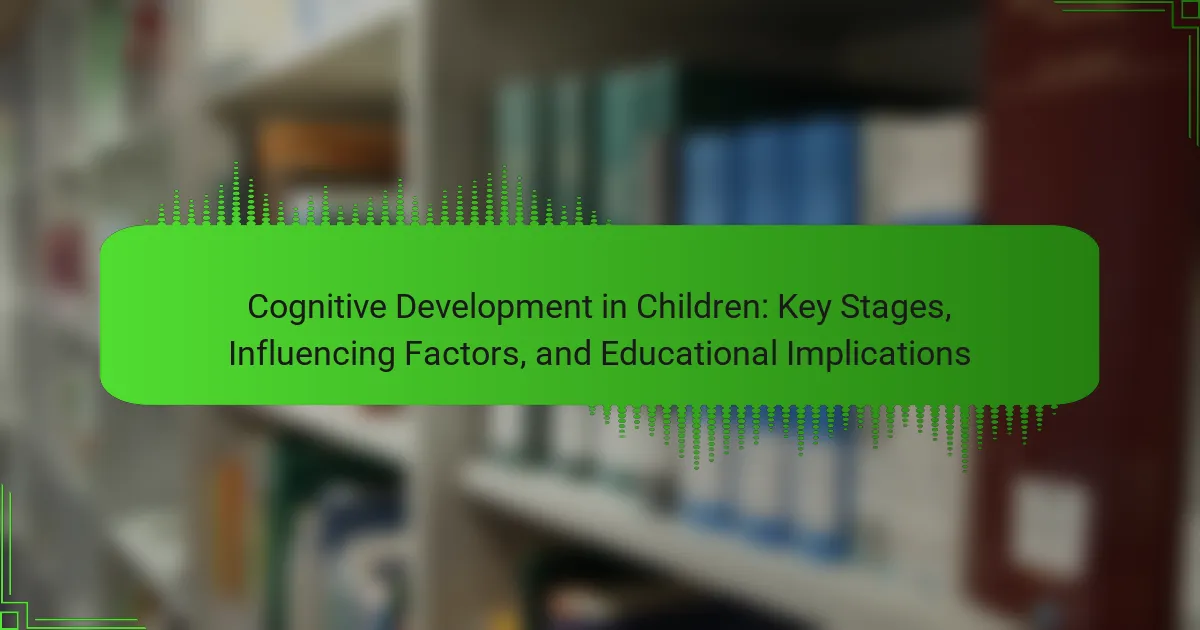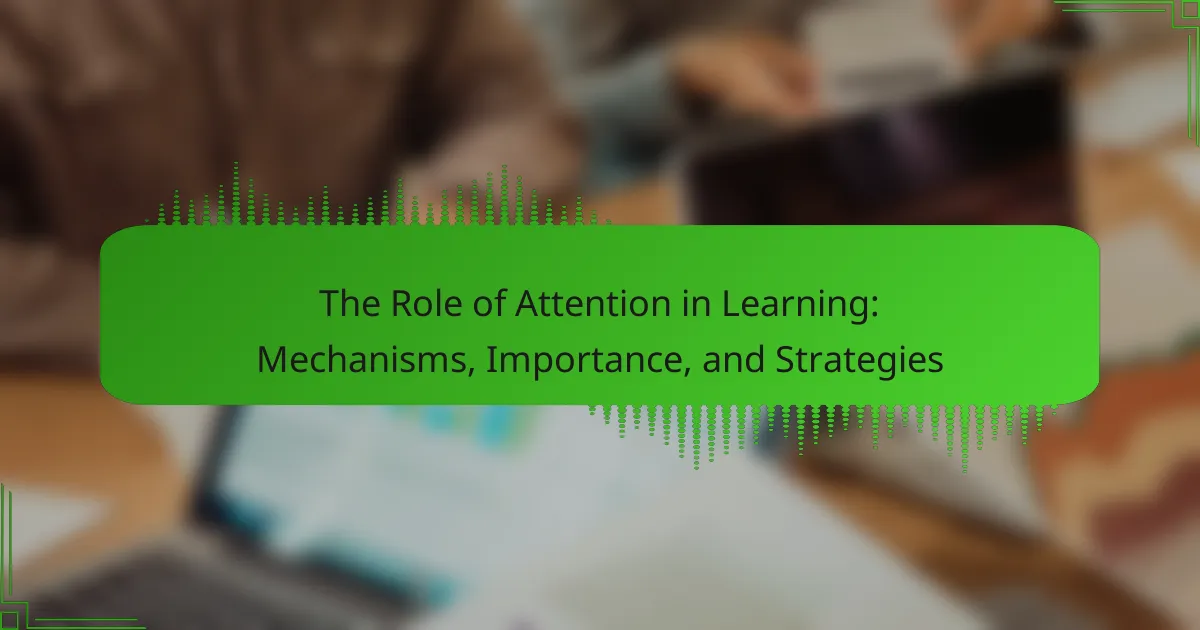Emotions are the primary entities influencing cognitive processes such as attention, memory, and decision-making. This article examines the complex interactions between emotions and cognition, highlighting how positive emotions can enhance creativity and problem-solving, while negative emotions may narrow focus and impair judgment. Research indicates that emotional states significantly alter information processing, affecting risk perception and choice-making. Additionally, the article explores how emotions impact memory recall, with emotionally charged experiences being remembered more vividly. Understanding these dynamics is essential for improving communication and learning strategies.
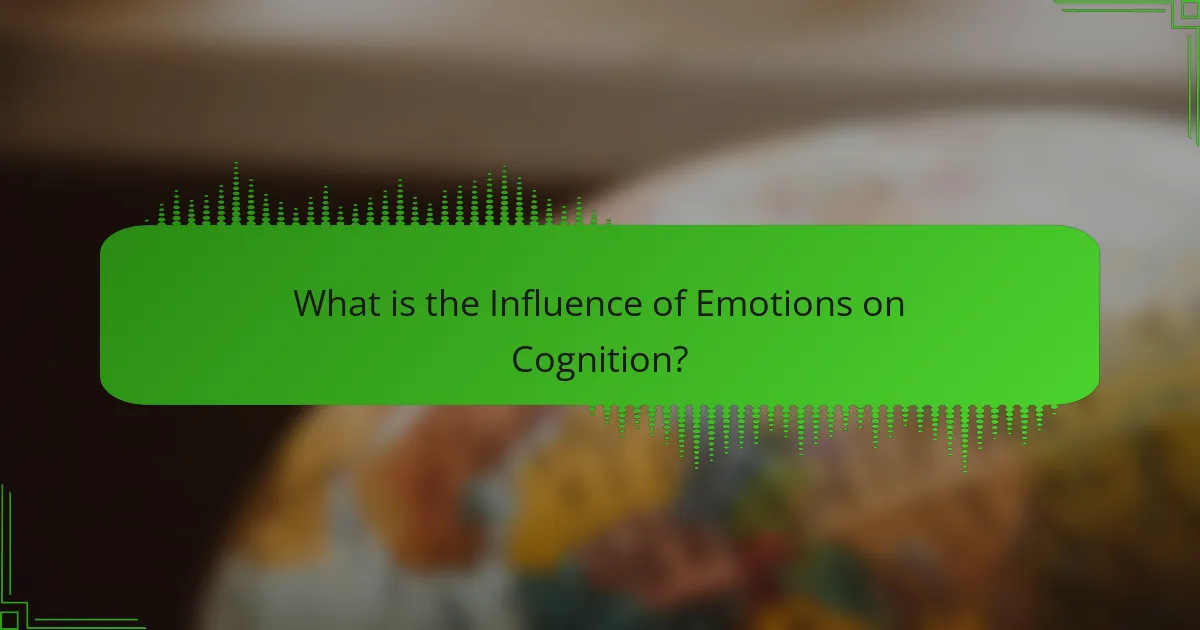
What is the Influence of Emotions on Cognition?
Emotions significantly influence cognition. They affect attention, memory, and decision-making processes. Positive emotions enhance creative thinking and problem-solving. Negative emotions can narrow focus and impair judgment. Research shows that emotional states can alter information processing. For example, studies indicate that anxiety can lead to cognitive biases. This influences how individuals perceive risks and make choices. Overall, emotions play a critical role in shaping cognitive functions.
How do emotions interact with cognitive processes?
Emotions significantly influence cognitive processes by affecting attention, memory, and decision-making. Emotional states can enhance or impair cognitive functions. For example, positive emotions often improve creative thinking and problem-solving. Conversely, negative emotions can lead to narrowed attention and biased decision-making. Research shows that emotions can facilitate memory retention, making emotionally charged events more memorable. The amygdala, a brain region linked to emotions, interacts with the hippocampus, which is crucial for memory formation. Studies indicate that emotional content in information increases its recall likelihood. This interplay suggests that emotions serve as a filter for cognitive processing, altering how information is perceived and acted upon.
What are the key cognitive processes affected by emotions?
Emotions significantly affect key cognitive processes such as attention, memory, decision-making, and problem-solving. Attention is influenced by emotions, as heightened emotional states can enhance focus on relevant stimuli. Memory is also impacted; emotionally charged events are often remembered more vividly than neutral ones. Research indicates that emotions can facilitate or hinder recall depending on the emotional context. Decision-making is altered by emotions, as they can lead to biased judgments or risk assessment. Problem-solving abilities may be enhanced or impaired based on emotional states, affecting creativity and analytical thinking. Studies show that positive emotions often promote flexible thinking, while negative emotions may narrow focus.
How do different emotions uniquely influence cognition?
Different emotions uniquely influence cognition by altering attention, memory, and decision-making processes. For instance, positive emotions like happiness enhance creative thinking and broaden attention. Research shows that individuals in a positive emotional state are more likely to generate innovative solutions. Conversely, negative emotions such as fear narrow focus and heighten attention to threats. This can lead to improved performance in situations requiring vigilance. Additionally, emotions like sadness can impair memory retrieval, making it harder to access previously learned information. Studies indicate that emotional states can bias judgment, affecting choices and evaluations. Overall, the emotional context significantly shapes cognitive functions, influencing how information is processed and decisions are made.
Why is understanding this influence important?
Understanding the influence of emotions on cognition is important because it shapes decision-making processes. Emotions can significantly affect how individuals perceive information and make judgments. For instance, research shows that positive emotions enhance creativity and problem-solving abilities. Conversely, negative emotions may lead to biases and impaired reasoning. Recognizing these effects allows for better management of emotional states in various contexts. In educational settings, this understanding can improve teaching strategies and learning outcomes. In business, it aids in creating effective marketing strategies that resonate with consumers’ emotional states. Overall, awareness of this influence enables more informed decisions across different aspects of life.
What implications does this have for mental health?
Emotional influences on cognition significantly impact mental health. Positive emotions can enhance cognitive flexibility and problem-solving abilities. Conversely, negative emotions may lead to cognitive distortions and impair decision-making. Research indicates that chronic stress affects brain function, contributing to anxiety and depression. For example, a study by McEwen (2007) highlights how stress hormones alter neural circuits, affecting mood regulation. Thus, understanding these interactions is crucial for developing effective mental health interventions.
How can this understanding improve decision-making?
Understanding the influence of emotions on cognition can significantly enhance decision-making. This understanding allows individuals to recognize emotional biases that may cloud judgment. By identifying these biases, decision-makers can adopt a more rational approach. Research indicates that emotions can affect attention and memory, influencing the information considered in decisions. For instance, a study by Lerner et al. (2015) demonstrated that fear can lead to risk-averse choices, while happiness can promote risk-taking. Awareness of these emotional impacts enables individuals to adjust their decision-making strategies accordingly. Consequently, informed decisions are more likely to lead to favorable outcomes.
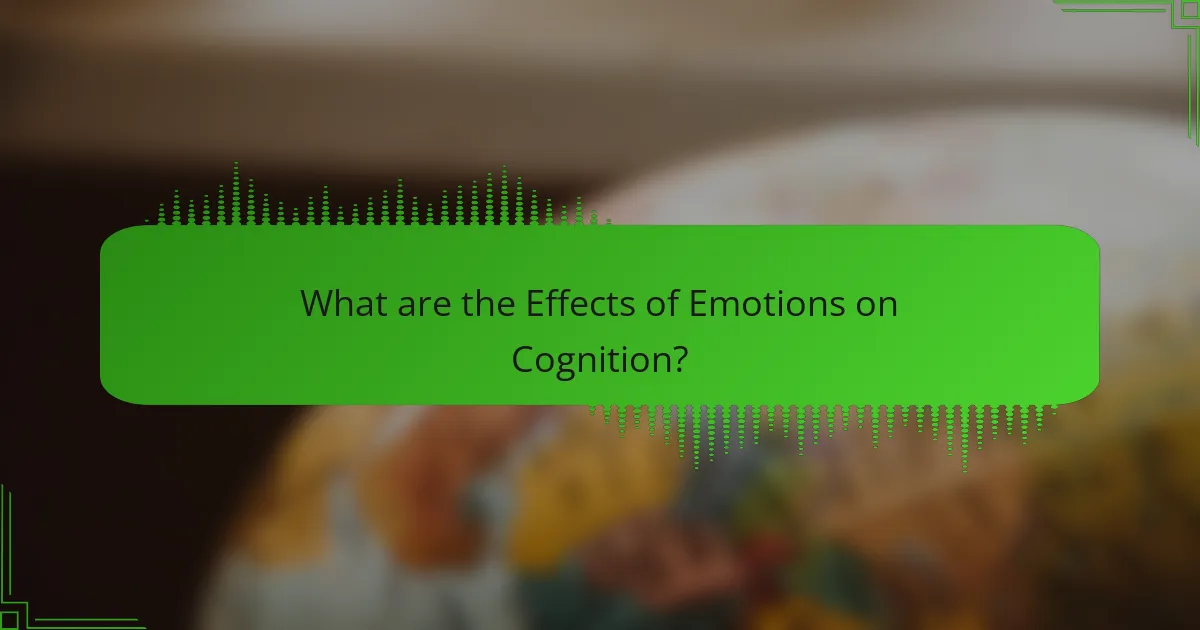
What are the Effects of Emotions on Cognition?
Emotions significantly affect cognition. They can enhance or impair cognitive processes such as attention, memory, and decision-making. Positive emotions often improve cognitive flexibility and creativity. For example, studies show that happiness can lead to better problem-solving abilities. Conversely, negative emotions like anxiety can narrow focus and reduce working memory capacity. Research indicates that stress impairs decision-making by overwhelming cognitive resources. Emotional states also influence the retrieval of memories, with emotions tied to specific events enhancing recall. Overall, emotions play a crucial role in shaping cognitive functions and outcomes.
How do emotions shape perception and attention?
Emotions significantly shape perception and attention by influencing how individuals process information. They act as filters, enhancing or diminishing the focus on specific stimuli. For instance, positive emotions can broaden attention, allowing for a more holistic view of the environment. Conversely, negative emotions often narrow attention, concentrating focus on potential threats. Research indicates that emotional states can alter neural pathways, impacting cognitive functions. A study by Dolcos et al. (2004) found that emotional stimuli are prioritized in memory recall, demonstrating their influence on perception. This suggests that emotions not only affect what we see but also how we interpret and react to it.
What role does emotional arousal play in attention allocation?
Emotional arousal significantly influences attention allocation. High levels of emotional arousal enhance the ability to focus on emotionally charged stimuli. This effect is due to the brain’s prioritization of information that is perceived as relevant or threatening. Research indicates that emotionally arousing events capture attention more effectively than neutral events. Studies show that individuals are more likely to remember emotionally charged information. This phenomenon is supported by findings from the “amygdala” which processes emotional stimuli and modulates attention. Emotional arousal thus acts as a filter, directing cognitive resources toward salient information.
How do emotions influence memory retention and recall?
Emotions significantly influence memory retention and recall. Emotional experiences are often remembered more vividly than neutral ones. This phenomenon is due to the amygdala’s role in processing emotions. The amygdala interacts with the hippocampus, which is crucial for forming memories. Research indicates that emotionally charged events are encoded more effectively. A study by Cahill and McGaugh (1998) demonstrated that participants recalled emotional stories better than neutral ones. This suggests that emotions enhance the consolidation of memories. Consequently, memories associated with strong emotions are often easier to retrieve.
What are the long-term effects of emotional influences on cognition?
Emotional influences can significantly affect cognition over the long term. These effects include changes in memory, decision-making, and problem-solving abilities. Positive emotions often enhance cognitive flexibility and creativity. Conversely, negative emotions can lead to cognitive biases and impairments. Research shows that prolonged stress can hinder memory consolidation and retrieval. Studies indicate that emotional experiences shape neural pathways, affecting future cognitive processes. For instance, the work of Dolcos et al. (2004) highlights how emotional memories are more easily recalled than neutral ones. This suggests that emotions play a crucial role in shaping cognitive functions long-term.
How do chronic emotional states affect cognitive decline?
Chronic emotional states negatively affect cognitive decline by impairing brain function. Prolonged stress, anxiety, and depression can lead to structural changes in the brain. For example, these emotional states can reduce the volume of the hippocampus, a region critical for memory. Research indicates that individuals with chronic stress show a decline in cognitive performance. A study published in “Frontiers in Human Neuroscience” found that chronic anxiety correlates with reduced executive function. Additionally, chronic emotional distress can disrupt neurotransmitter systems, impacting mood and cognition. This interplay leads to increased risk for cognitive disorders such as dementia.
What are the effects of emotional regulation on cognitive function?
Emotional regulation significantly impacts cognitive function. Effective emotional regulation enhances attention, decision-making, and problem-solving abilities. It allows individuals to manage their emotions, leading to improved focus on tasks. Research indicates that individuals who practice emotional regulation exhibit better working memory performance. A study by Deschamps et al. (2017) found that participants with strong emotional regulation skills performed better in cognitive tasks. This suggests that emotional regulation fosters a conducive environment for cognitive processes. Therefore, mastering emotional regulation can lead to enhanced cognitive performance and overall mental functioning.
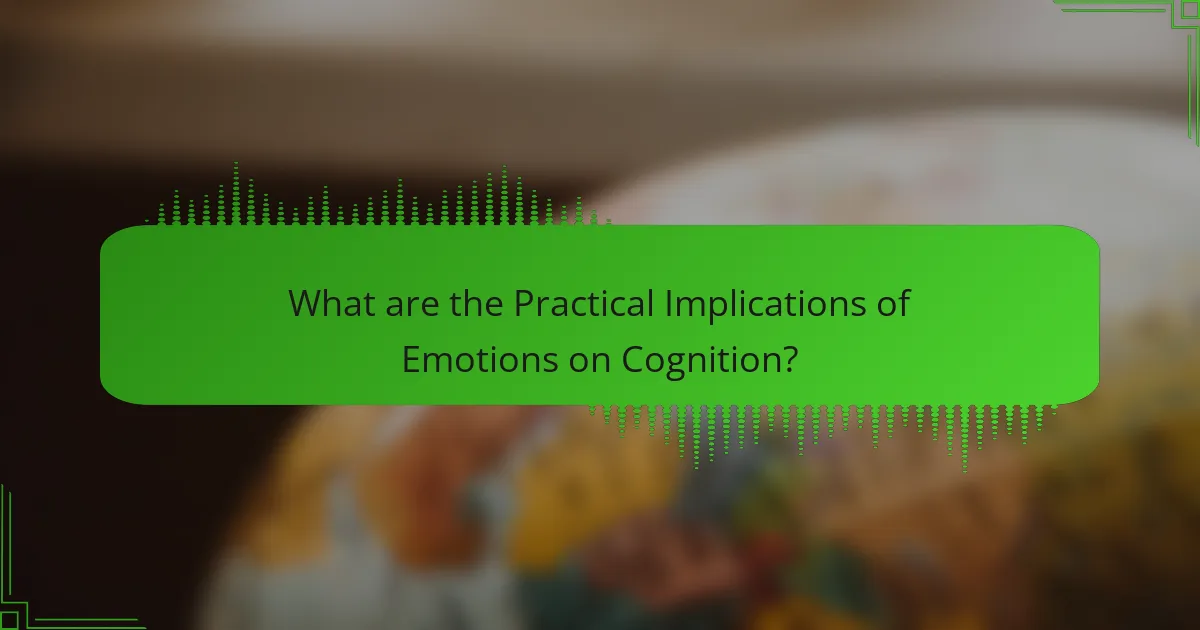
What are the Practical Implications of Emotions on Cognition?
Emotions significantly influence cognition, affecting decision-making, memory, and problem-solving. Positive emotions enhance creativity and broad thinking. They encourage individuals to explore new ideas and solutions. Negative emotions, however, can narrow focus and lead to more analytical thinking. This can be beneficial in risk assessment and critical evaluation. Emotional states can also impact memory recall, with emotionally charged events being remembered more vividly. Research shows that mood can alter cognitive flexibility, influencing how information is processed. For instance, studies indicate that happy individuals are more likely to engage in divergent thinking. Conversely, sadness can enhance detail-oriented tasks. Therefore, understanding these implications is crucial for effective communication and learning strategies.
How can this knowledge be applied in educational settings?
Understanding the influence of emotions on cognition can enhance educational practices. Educators can tailor their teaching methods to align with students’ emotional states. For instance, positive emotions can improve engagement and retention of information. Research shows that students perform better in emotionally supportive environments. Implementing techniques like mindfulness can help regulate emotions in the classroom. Additionally, incorporating emotional awareness into curricula fosters social-emotional learning. This approach leads to improved academic outcomes and better interpersonal skills among students.
What strategies can educators use to harness emotional influences?
Educators can harness emotional influences by creating a supportive classroom environment. This involves fostering positive relationships with students. When students feel valued, their emotional engagement increases. Incorporating social-emotional learning (SEL) programs can also be effective. SEL enhances emotional awareness and regulation skills. Utilizing storytelling and relatable content can evoke empathy and connection. Regular feedback helps students understand their emotional and academic progress. Additionally, integrating mindfulness practices can improve emotional regulation. Research shows that positive emotions enhance cognitive performance, leading to better learning outcomes.
How can emotional awareness enhance learning outcomes?
Emotional awareness can enhance learning outcomes by improving student engagement and motivation. When learners recognize their emotions, they can better manage stress and anxiety. This self-regulation leads to increased focus during lessons. Research shows that emotionally aware students perform better academically. A study by Brackett et al. (2013) found that emotional intelligence correlates with higher grades. Additionally, emotional awareness fosters a positive classroom environment. This atmosphere encourages collaboration and communication among peers. Ultimately, understanding emotions can lead to more effective learning strategies.
What tips can individuals use to manage emotions for better cognition?
Individuals can manage emotions for better cognition through several practical strategies. First, practicing mindfulness helps individuals become aware of their emotional states. Mindfulness techniques, such as meditation, have been shown to improve attention and reduce stress. Second, engaging in regular physical exercise is beneficial. Research indicates that exercise releases endorphins, which can enhance mood and cognitive function. Third, maintaining a balanced diet supports emotional stability. Nutritional studies demonstrate that omega-3 fatty acids can positively affect brain health. Fourth, establishing a strong social support network is crucial. Studies reveal that social interactions can buffer against negative emotions and enhance cognitive resilience. Lastly, utilizing cognitive reframing techniques allows individuals to view situations from different perspectives. Cognitive-behavioral research shows that this approach can reduce emotional distress and improve decision-making.
How can mindfulness practices improve cognitive performance?
Mindfulness practices can improve cognitive performance by enhancing attention, memory, and executive function. These practices promote focused awareness and reduce mind-wandering. Research indicates that mindfulness training can lead to structural changes in the brain, particularly in areas related to cognitive control. A study by Zeidan et al. (2010) found that just four days of mindfulness meditation significantly improved working memory and attention. Additionally, mindfulness reduces stress, which is known to negatively impact cognitive abilities. By fostering emotional regulation, mindfulness also supports better decision-making processes. Overall, mindfulness practices contribute to improved cognitive performance through various mechanisms.
What are effective techniques for emotional regulation in daily life?
Effective techniques for emotional regulation in daily life include mindfulness, cognitive restructuring, and deep breathing exercises. Mindfulness involves being present and aware of emotions without judgment. Research shows that mindfulness can reduce emotional reactivity and enhance emotional regulation skills. Cognitive restructuring helps individuals challenge and reframe negative thoughts. Studies indicate that this technique can lead to improved emotional responses. Deep breathing exercises promote relaxation and reduce stress. Evidence suggests that controlled breathing can lower anxiety and enhance emotional stability. Other techniques include journaling, physical activity, and social support. These methods collectively contribute to better emotional management in everyday situations.
The main entity of this article is the influence of emotions on cognition, which encompasses how emotional states affect cognitive processes such as attention, memory, and decision-making. The article explores the interactions between emotions and cognition, highlighting the ways positive and negative emotions can enhance or impair cognitive functions. It discusses the implications of these influences for mental health, decision-making, and educational practices, providing practical strategies for managing emotions to improve cognitive performance. Key findings from research are presented to underscore the significance of understanding emotional impacts on cognition in various contexts.
